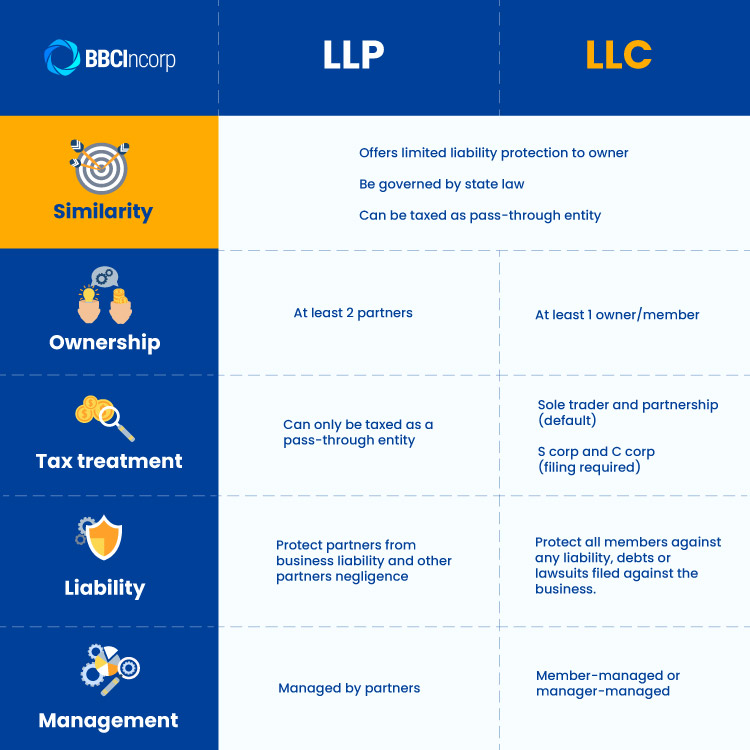
Up until a few decades, entrepreneurs can only choose to incorporate either a company, partnership, or sole proprietorship. Each type of structure has distinctive pros and cons, for instance, a partnership offers ease of formation and more significant tax advantages but it exposes the partners to personal liabilities. This has resulted in the formation of a Limited Liability Partnership (LLP) which is a fusion of the advantages between a company and a partnership.
This type of business structure is most popular among licensed professionals who want to open a private practice, including lawyers, doctors, and architects. In this blog post, we will discuss what an LLP is and walk you through the steps to create one. We will also cover some of the benefits that make LLPs so appealing to entrepreneurs.
What is an LLP?
An LLP is popular among business legal structure types in the USA, it is a type of partnership in which all partners have limited liability for the business’s debts and obligations.
Partners in the LLP can actively participate in daily operations and decision-making processes. Each partner takes full responsibility for individual actions but is not personally liable for the negligence and misconduct of co-partners, which makes LLPs attractive to entrepreneurs who want to share management duties while still enjoying liability protection.
An LLP is not permitted in every state, and each state regulates LLPs differently. In fact, the LLP structure is only available to professionals in some states. For instance, California, Nevada, and New York only allow licensed professionals such as accountants, attorneys, and architects to operate as LLPs.
Tips
Unsure whether an LLP is a good fit for you? Try our US Business Entity Selection Tool and work through the questions to get personalized recommendations for your business.
The benefits of an LLP
Liability protection
The partners are only personally liable for their own actions, not for the LLP’s liabilities or other partners’ actions.
This gives you peace of mind because you know your personal assets are safe if the company suffers financial losses or is involved in a lawsuit.
Pass-through taxation
LLP companies are taxed as pass-through entities, meaning the profits are reported on the partners’ personal income tax returns, and any taxes owed are paid individually.
This enables LLP partners to avoid double taxation and deduct losses from their taxes, which can be beneficial if the LLP has a bad fiscal year or incurs losses to deduct losses from their taxes, which can be advantageous if the LLP has a bad financial year or incurs losses.
Additional partners’ support
You can start and grow a business with less financial risk if you work with partners rather than going it alone. Partnerships can facilitate knowledge and expertise sharing while also providing much-needed emotional support during the ups and downs of running a business.
Flexible management
LLPs are adaptable and can evolve to meet the needs of partners. For example, partners can agree to change how profits and losses are shared or how business decisions are made.
If one of the partners decides to leave the LLP, the remaining partners can choose to dissolve the company or keep it running. LLPs can also be transformed into another type of business entity, such as a corporation.
The drawbacks of an LLP
Not recognized in every state
LLPs are not recognized in many states in the US. For instance, Alabama, Arkansas, and Georgia do not allow LLPs. So if you’re thinking of forming an LLP, make sure to check the state’s laws first.
Restricted for certain professions
In some states, LLP status is only available to certain types of businesses, such as law firms, accounting firms, and architectural firms. This may limit your option and opportunities for your business.
Complexity and compliance
An LLP is a more complex business structure than a sole proprietorship or partnership, and it requires more compliance with state and federal laws. This can mean more paperwork and expenses, so you’ll need to weigh the costs and benefits of an LLP before deciding if it’s right for your business.
Three best states to register an LLP
At this point, you already have a basic understanding of an LLP and how it can benefit your business. It’s time you decide where to incorporate your LLP.
The decision can be complicated, and it’s important to understand the state laws as well as various factors that can influence your LLP’s success. Each state carries its own set of advantages, benefits, and possible issues.
We’ve summarized a list of the three best states for your to register your LLP:
Wyoming
One of the most business-friendly states in the nation, making it a great place to form an LLP. Plus, there’s no corporate income tax, so your LLP will save money right off the bat.
Moreover, Wyoming has flexible LLP laws, meaning you’ll have more freedom to operate your business the way you want to. And if you decide to do business in other states such as Montana or Colorado, you’ll find it easier to do so from Wyoming.
Nevada
Like Wyoming, Nevada offers favorable tax treatment for businesses, including no corporate income tax and no personal income tax.
In addition, the state has a very pro-business environment, with few regulations and a relatively simple process for forming an LLP. Nevada also has one of the lowest crime rates, providing a safe, positive environment to operate and grow your firm.
Delaware
The state of Delaware is well-known for being the most appealing marketplace for many enterprises in the US. One of the key benefits of starting a business in Delaware is that you can take advantage of the state’s Court of Chancery, which specializes in business disputes and provides a more efficient process than going through the general state court system.
Plus, there are no residency requirements for LLP members, which can be appealing if your LLP will have members located in different states.
The state laws and regulations make it easy to form and operate your business and provide access to a well-developed infrastructure and a skilled workforce, which are both important factors in LLP success.
The comparison between LLC and LLP

The alikeness of LLP and LLC
Both structures offer limited liability protection to the owners, meaning no personal liability for the debts and obligations of the business.
The LLP is less formal than the LLC, which can make it easier to operate. There are few restrictions on how an LLP can be run, giving you more flexibility in how you want to run a business.
The LLP is a pass-through entity for tax purposes, which means the business owners will report the LLP’s income and losses on their personal tax returns. The LLP itself does not pay taxes.
A multi-member LLC can also be treated as a pass-through entity for tax purposes unless it files to be treated as a corporation.
However, there are some key differences that you should be aware of before deciding which type of entity is right for your business.
The difference between LLP and LLC
Ownership
An LLP can be formed with at least two partners, whereas an LLC can be formed with only one owner (also known as a member).
Liability
LLCs offer slightly more protection to owners, as there is only one owner who is potentially liable for the debts of the business.
LLP partners, on the other hand, face greater liability risks because each partner is still fully responsible for their own individual actions.
Tax treatment
An LLP can only be taxed as a pass-through entity, whereas an LLC offers more flexible tax treatment.
Aside from the two default tax statuses provided by the IRS, LLCs can also file to be taxed as S-Corporations or C-Corporations.
Management
An LLC can be run by 2 approaches, which are member-managed or manager-managed. On a flip note, an LLP is operated by the partners in accordance with the partnership agreement.
Key takeaway
An LLP is a business structure that offers features of both a corporation and a partnership. Like a corporation, an LLP has limited liability, meaning that the owners are not personally liable for the debts and liabilities of the business. And like a partnership, an LLP is not taxed as a separate entity; instead, the profits and losses are “passed through” to the individual owners and taxed on their personal tax returns.
By now you’ve already obtained a good understanding of what an LLP is, how it’s similar to and different from an LLC, and the best states in which you can form an LLP. If you think an LLP is the right business structure for you, feel free to drop a message via service@bbcincorp.com so we can talk more about your specific case.
Disclaimer: While BBCIncorp strives to make the information on this website as timely and accurate as possible, the information itself is for reference purposes only. You should not substitute the information provided in this article for competent legal advice. Feel free to contact BBCIncorp’s customer services for advice on your specific cases.
Get helpful tips and info from our newsletter!
Stay in the know and be empowered with our strategic how-tos, resources, and guidelines.


